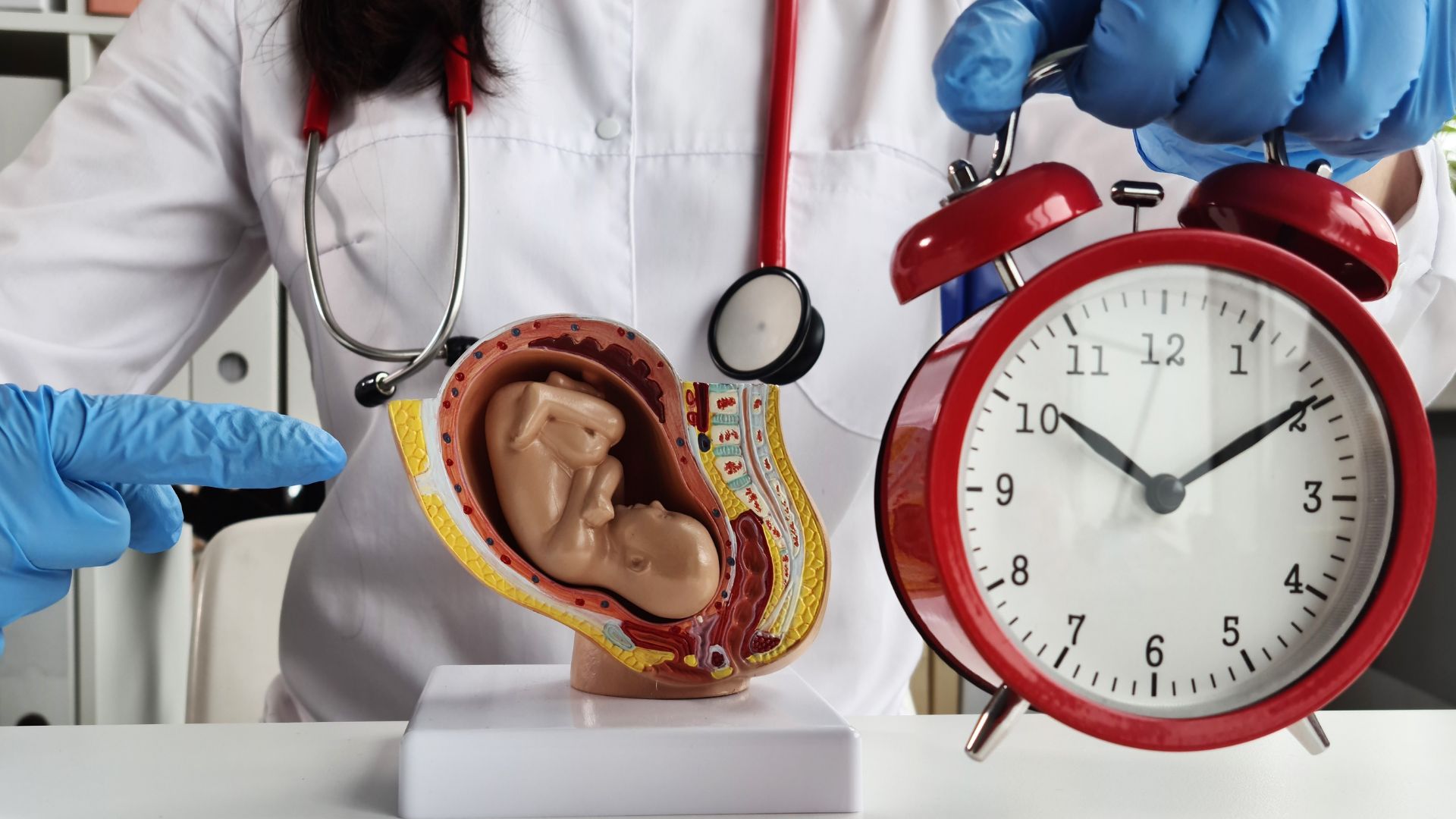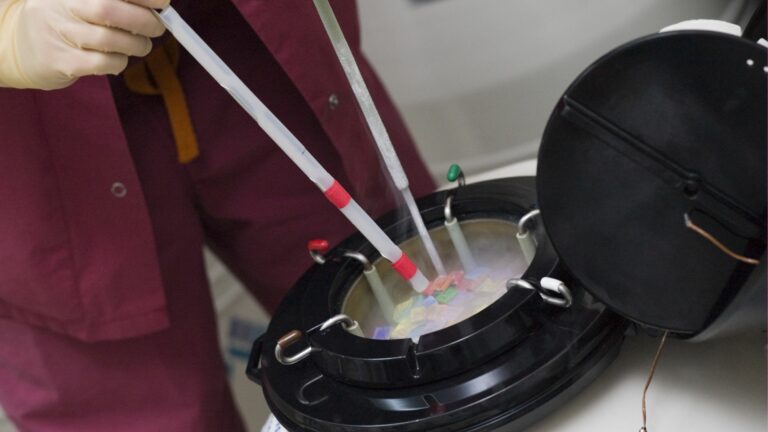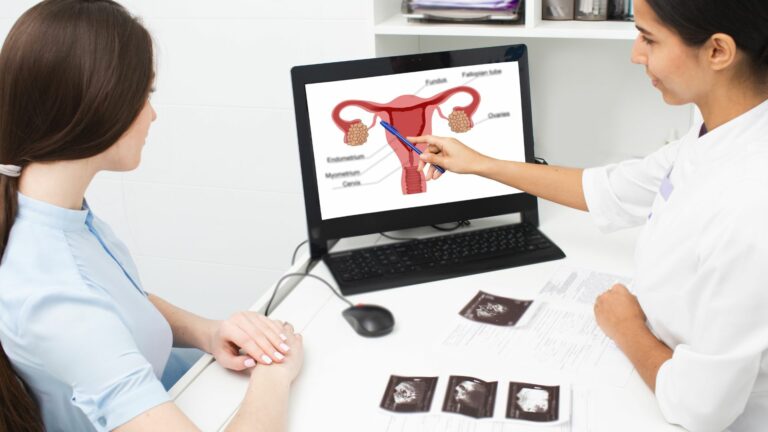
The two-week wait after an embryo transfer is an emotionally fraught time for anyone undergoing IVF treatment.
The hope of finally achieving a long-awaited pregnancy hangs in the balance, and it’s natural to scrutinize every potential bodily change as a possible sign of success.
However, deciphering these early signals can be incredibly tricky, and it’s important to understand the factors that make them so ambiguous in the context of IVF.
| Key Takeaways |
|---|
| 1. Early signs after IVF can be exciting hints, but they’re not definitive proof. |
| 2. Implantation spotting, cramping, and early pregnancy symptoms can be misleading due to hormonal fluctuations and the power of the mind. |
| 3. The beta hCG blood test is the only reliable confirmation of IVF success. |
| 4. Focus on self-care and seeking support during the emotional two-week wait. |
In this article, we’ll be your guide to understanding these early signs, why they can be misleading, and the importance of a reliable test for confirmation.
So, let’s dive in and unpack the reality of early signs in IVF – they might spark hope, but they’re not guarantees.
Section 1: Decoding Potential Signs (But Remember, They’re Not Guarantees)
While a positive pregnancy test is the ultimate goal, some early signs might ignite that flicker of excitement.
Let’s break down the most common ones, along with some key facts to help you interpret them:
1. Implantation Spotting/Bleeding
What it is: This is light vaginal spotting or bleeding that can occur 6-10 days after the embryo transfer. It happens when the embryo implants itself into the uterine lining, sometimes causing tiny blood vessels to break.
The Stats: Studies show that implantation bleeding occurs in 20-30% of successful IVF pregnancies. However, it’s crucial to remember that not everyone who experiences implantation bleeding will have a successful pregnancy, and many women who have successful pregnancies won’t experience bleeding at all.
Actionable Tip: The color and amount can be helpful clues. Implantation bleeding is usually lighter pink or brown spotting, compared to the heavier red flow of a period. If you experience heavier bleeding or cramping, it’s best to contact your fertility clinic.
2. Cramping
What it feels like: Mild cramps similar to menstrual cramps can sometimes occur around the time of implantation.
The Cause is a Mystery: Cramping during the two-week wait can be caused by implantation, but it’s also a common side effect of progesterone medication used to support the uterine lining. Unfortunately, there’s no way to tell for sure which is causing the cramps.
The Reality Check: Up to 70% of women undergoing IVF experience cramping during the two-week wait. While it can be a hopeful sign, it’s definitely not a reliable indicator of success.
3. Early Pregnancy Symptoms (Nausea, Fatigue, Breast Tenderness)
The Tempting Connection: These symptoms can be very similar to early pregnancy signs. You might experience nausea, fatigue, breast tenderness, or even frequent urination.
The Hormonal Culprit: Unfortunately, these symptoms can also be caused by the hormonal fluctuations due to IVF medications.
Timing is Key: True pregnancy symptoms are caused by rising levels of human chorionic gonadotropin (hCG), the pregnancy hormone. It takes time for these levels to build up significantly, so very early symptoms (before the beta test) are less likely to be a definitive sign.
Remember: Every woman’s body is unique, and you may experience none, some, or all of these signs. The key takeaway? These early signs are interesting, but they shouldn’t be solely relied upon to determine pregnancy success.
Why It’s Difficult to Tell This Early
The excitement of potential early signs during the IVF two-week wait is understandable. However, there are a few crucial factors that make interpreting these signs a complex puzzle, especially in the context of IVF:
The Hormone Factor
IVF protocols involve administering hormones, predominantly progesterone, to prepare the uterus for a successful pregnancy.
These hormones cause significant fluctuations in levels of estrogen and progesterone, which mimic many of the early symptoms of pregnancy.
The bottom line: It’s nearly impossible to distinguish between side effects of the medication and true early pregnancy symptoms.
The Power of the Mind
It’s no secret – the two-week wait is incredibly stressful. This heightened emotional state can easily amplify bodily awareness, making even minor changes feel significant.
Stress can even influence your body, sometimes leading to temporary symptoms that might feel like pregnancy signs.
This heightened focus on every sensation can be a double-edged sword – it might catch a true signal, but it’s more likely to create misleading ones.
IVF Isn’t One-Size-Fits-All
Every person’s response to IVF medications and the process itself is unique. You might have a completely different experience with symptoms in one cycle than in a previous or future cycle.
Comparing your current experience with past cycles or with other people’s stories can be tricky – everyone’s journey is different.
Tip: Focusing too heavily on potential early signs can lead to a rollercoaster of hope and disappointment.
It’s best to approach them with a healthy dose of skepticism and understand that they’re not crystal ball predictions of your IVF outcome.
Remember, you’re not alone in this journey. If you’re struggling to cope with the uncertainty and emotional turbulence of the two-week wait, consider reaching out to online support groups or finding an IVF-friendly therapist who can offer guidance and coping strategies.
The road ahead might feel daunting, but trust in the process and your own resilience. In the next section, we’ll explore why the beta hCG blood test is your true answer amidst all the ambiguity of early signs.
The Importance of the Beta hCG Blood Test
After weeks of hopes, fears, and scrutinizing every bodily change, it’s time for the definitive answer: the beta hCG blood test.
While those early signs might have sparked curiosity, this test provides the reliable confirmation you need. Here’s why it matters:
Understanding hCG: Your Pregnancy Indicator
| Key Facts About hCG |
|---|
| 1. hCG is produced by the developing placenta, making it a direct sign of pregnancy. |
| 2. In early pregnancy, hCG levels double every 48-72 hours. |
| 3. The beta hCG blood test measures the exact amount of hCG in your blood. |
What it is: Human chorionic gonadotropin (hCG) is a hormone produced by a developing placenta, making it a direct sign of pregnancy. It’s often called the ‘pregnancy hormone’ for a reason!
How levels change: In early pregnancy, your hCG levels will rise rapidly, sometimes even doubling every couple of days. This rapid rise is what makes it a clear indicator.
The “Home Test” Caveat: While a positive home pregnancy test after IVF is exciting, it’s a good idea to stick with the beta hCG blood test.
This is because home tests generally aren’t as sensitive and might not pick up on very early, lower levels of hCG.
Why The Beta hCG Blood Test Is Different
It’s not about feelings, it’s about science: Unlike interpreting potentially vague signs like cramps or nausea, the beta hCG test measures the exact amount of pregnancy hormone present in your blood. This cuts through the guesswork.
Sensitivity is key: Beta hCG tests are designed to pick up on even the tiniest amounts of hCG. That means you’ll get a reliable ‘yes‘ or ‘no‘ while you might still be in the “maybe” stage of symptom interpretation.
Timing Matters: Your clinic schedules your beta hCG test for a specific day (usually around 14 days after your embryo transfer) for a reason.
This ensures enough time for hCG levels to become high enough to detect if you are indeed pregnant. Testing too early can lead to false negatives and unnecessary heartbreak.
The Waiting Game: How to Handle Those Final Days
We know those last few days before your test can feel like an eternity! Here’s how to manage the anxiety and focus on what you can control:
| Tips for Surviving the Final Wait |
|---|
| 1. Distract yourself with hobbies, movies, or exploring something new. |
| 2. Talk to your partner, a trusted friend, or find support in online IVF communities. |
| 3. Practice self-care: Rest, nourish your body, and engage in gentle exercise if your clinic approves. |
| 4. Consider mindfulness techniques to manage stress and anxiety. |
The Big Picture: The beta hCG test is a crucial step in your IVF journey. Trust your clinic’s guidance and remember they’re invested in helping you achieve your goals.
While you wait for your results, it’s important to take care of your emotional well-being. Consider joining an IVF support group or seeking guidance from a therapist specializing in infertility. Remember, you’re not alone in this journey.
Section 4: Beyond the Symptoms: Finding Support & Managing Expectations
The two-week wait after IVF isn’t just about physical signs or test results; it’s an emotionally charged time that takes a toll.
Prioritizing your mental well-being and understanding how your IVF outcome relates to the bigger picture is crucial.
You’re Not Alone
The IVF journey can feel isolating, but it’s important to know that you have a community. Don’t hesitate to seek support from:
- Your Partner: Open communication with your partner is vital for navigating this together.
- Close Friends and Family: Lean on those who offer understanding and a listening ear.
- Online Support Groups or Communities: Find others who truly “get it” through online forums like RESOLVE.
- Therapists specializing in infertility: A professional can offer invaluable coping strategies and emotional support.
- Local IVF Support Groups: Connect with others in your area who are going through similar experiences. Check for support groups in cities like Gurgaon, Dehradun, Kolapur, Warangal, Asansol, Nanded-Waghala, Ajmer, Jamnagar, Siliguri, and Belgaum.
A Healthy Perspective
It’s easy to get caught up in the immediate result of an IVF cycle, but remember, it’s just one piece of the puzzle.
A positive pregnancy test: This is a wonderful milestone, but it’s important to understand that it’s not a guarantee of a trouble-free pregnancy. Focus on taking things one step at a time.
A negative pregnancy test: This can feel devastating. Allow yourself to grieve, but don’t let it define your worth or deter you from exploring future options. Your IVF journey may not be over.
Key Takeaway: Whether the outcome of this cycle is what you hoped for or not, you’ve shown incredible strength and resilience. Seek support, be kind to yourself, and remember that your determination is an inspiring force.
If you’re struggling with the emotional impact of IVF, consider these resources:
Remember, your worth is not defined by the outcome of this cycle. You are so much more than your fertility journey.
Conclusion
Trying to decipher early signs after IVF can feel like solving a complex riddle. While some signs might be promising, the only true answer lies in the beta hCG blood test.
Remember that this is a uniquely challenging time – lean on your support system, prioritize emotional well-being, and maintain a healthy perspective on your incredible journey.
We’re here for you: IVF can bring about a wide range of emotions. If you’re struggling, please know that you’re not alone. Reach out to your support systems, seek professional help, and find communities online.
Your resilience is awe-inspiring. No matter what the outcome of this cycle may be, remember that you have the strength to face what lies ahead. Keep hope alive, but be kind to yourself. You’ve got this.






